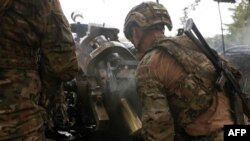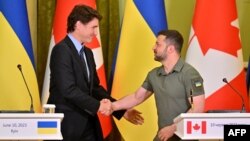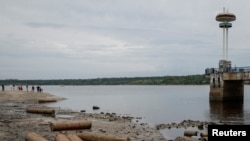Latest developments:
- The British Defense Ministry said Sunday in its daily intelligence update on Russia’s invasion of Ukraine that the collapse of the Kakhovka Dam has left the Russian and Ukrainian communities on either side of the flooded Dnipro “facing a sanitation crisis with limited access to safe water, and an increased risk of water-borne diseases.”
- French President Emmanuel Macron urged Iran on Saturday to "immediately cease” delivering drones to Russia, a violation of a 2015 U.N. Security Council resolution on the Iran nuclear deal. The White House said Friday that Russia appeared to be deepening its defense cooperation with Iran and had received hundreds of one-way attack drones that it is using to strike Ukraine.
- German Chancellor Olaf Scholz said Saturday he planned to speak with Russian President Vladimir Putin by phone soon to urge him to withdraw Russia's troops from Ukraine.
- German investigators are examining evidence suggesting a sabotage team used Poland as an operating base to damage the Nord Stream pipelines in the Baltic Sea last September, The Wall Street Journal reported Saturday. It has not been determined who is responsible for the attack.
Heavy fighting is taking place in eastern Ukraine, around Bakhmut and Maryinka, where Ukrainian forces reportedly have repelled Russian advances, Ukraine’s general staff said Saturday. Russian forces, it said, "continue to suffer heavy losses which they are trying to conceal."
The General Staff of the Armed Forces of Ukraine said Russian forces carried out 66 airstrikes and launched 39 attacks from rocket systems.
"Unfortunately, there are dead and wounded among the civilian population, private houses and other civil and administrative infrastructure have been destroyed and damaged," the general staff said in its Saturday evening update, according to Radio Free Europe/Radio Liberty.
Earlier Saturday, Ukrainian President Volodymyr Zelenskyy confirmed that “appropriate counteroffensive and defensive actions are taking place in Ukraine,” but he did not divulge any information on what’s happening on the battlefield.
However, he did exude optimism, saying his generals “are all in a positive mood, pass that on to Putin," he said during a news conference in Kyiv alongside visiting Canadian Prime Minister Justin Trudeau.
In his nightly video address, he said, “Thank you to all those who hold their positions and those who advance," citing the eastern and southern fronts, where fighting is heaviest.
Russia says Ukraine is making a big offensive push this week, but that Kyiv's forces failed to breach Russian defenses and sustained heavy casualties.
The British Defense Ministry said Saturday that Ukraine has conducted significant operations in the last 48 hours in its eastern and southern regions. Ukrainian forces have “likely made good progress and penetrated the first line of Russian defenses” in some areas, the daily intelligence update said. In other areas, Ukrainian progress has been slower.
Independent media have not been able to confirm whether Ukraine was penetrating Russian defenses.
Canadian aid to Ukraine
During his visit in Kyiv, Trudeau announced new military aid for Ukraine.
“We will provide $500 million in new funding,” he said during a joint news conference with Zelenskyy. "We will be there with (you) as much as it takes, for as long as it takes."
Zelenskyy offered Canada assistance in extinguishing the wildfires raging there.
“Ukraine is ready to help extinguish fires if Canada needs such international assistance,” he said. And in his Saturday night video address, he thanked Trudeau and the Canadian people for their support.
Kakhovka dam ‘ecocide’
During his address, Zelenskyy thanked those who are helping support the communities devastated by the collapse of the Kakhovka dam, calling it an “ecocide and human tragedy caused by the Russian terrorist attack on the Kakhovka HPP.”
“As of now, over 3,000 people have already been evacuated in (the) Kherson and Mykolaiv regions. But again, it is only a free territory under our control,” adding that, in the occupied territory, it is only possible to help in some areas only as Russian shelling continues.
At least 700,000 people need drinking water after the collapse of the Kakhovka dam in Ukraine, said U.N. Undersecretary-General Martin Griffiths. The U.N.’s aid chief said the humanitarian situation in the country has gotten “hugely worse” since the rupture of the dam. He warned that the flooding in one of the world's most important breadbaskets will almost inevitably lead to lower grain exports, higher food prices around the world and less to eat for millions in need.
Clear signals have emerged that an explosion occurred at the Kakhovka dam in southern Ukraine early Tuesday morning, the Norwegian seismic research foundation Norsar said. While Russians and Ukrainians have traded accusations over the destruction of the Soviet-era dam, it has been under Russian control since early in the invasion.
Black Sea grain deal
Russia could still walk away from the U.N.-brokered Black Sea Grain Deal on July 17, when the agreement expires, if its demands are not met, said Russia’s deputy foreign minister, Sergey Vershinin. Vershinin made the comments Saturday after meeting with senior U.N. trade officials Friday, the TASS news agency reported.
Vershinin expressed his dissatisfaction with the way the memorandum is implemented.
"Barriers to our exports remain," he said.
The demands outlined by Moscow include the resumption of the transit of ammonia from Russia via Ukrainian territory to Pivdennyi port in Odesa, from where it is exported and the reconnection of the Russian Agricultural Bank to the SWIFT international payment system.
Some information in this report came from The Associated Press, Reuters and Agence France-Presse.







